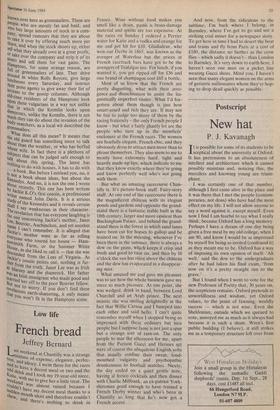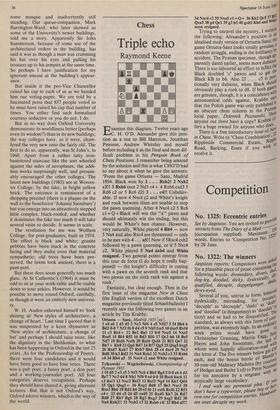Postscript
New hat
P. J. Kavanagh It is possible for some of its students to be sceptical about the university at Oxford. It has pretensions to an absoluteness of intellect and architecture which it cannot possibly maintain and, noticing this, the merciless and knowing young are trium- phant.
I was certainly one of that number, although I first came alive in the place and it was there that I met the people (contem- poraries, not dons) who have had the most effect on my life. I will not allow anyone to say a word against it, except myself. Even now I find I am fearful to say what I really think, because Oxford has a long memory. Perhaps I have a dream of one day being given a free meal by my old college, when I am 90, and know I would be as impressed by myself for being so invited (confound it) as they meant me to be. Oxford has a way of imposing its own opinion of itself: `Ah well,' said the don to the undergraduate after he had taken his final exam, 'from now on it's a pretty straight run to the grave.'
But I found when I went to vote for the new Professor of Poetry that, 30 years on, the scepticism remains. Oxford pretends to unworldliness and wisdom, yet Oxford values, to the point of fawning, worldly success — which is not wise. Even the Sheldonian, outside which we queued to vote, annoyed me as much as it always had because it is such a sham. Wren's first public building (I believe), it still strikes me as a temporary structure left over from
some masque and inadvertently still standing. Our queue-companion, Mark Barrington-Ward, who later showed us some of the University's newer buildings, told me a story. Apparently Sir John Summerson, because of some use of the architectural orders in the building, has said it was as though a man was cramming his hat over his eyes and pulling his trousers up to his armpits at the same time. So perhaps I have justification for my ignorant unease at the building's appear- ance.
But inside it the pro-Vice Chancellor raised his cap to each of us as we handed him our voting-paper. We are told by a fascinated press that 837 people voted so he must have raised his cap that number of times. You either find such formalised courtesy seductive or you do not. I do.
But in no way does Oxford University demonstrate its worldliness better (perhaps even its wisdom?) than in its new buildings; the way colleges have, as it were, cham- fered the very new onto the fairly old. The first to do so, apparently, was St John's, in 1960. Apart from a rather tatty iron- banistered staircase like the sort wheeled against the sides of aeroplanes, the addi- tion works surprisingly well, and presum- ably encouraged the other colleges. The latest new buildings (1983) are at Worces- ter College, by the lake, in bright yellow brick. The entrance is reminiscent of a shopping precinct (there is a plaque on the wall to the benefactor lohanni Sainsbury') but you emerge into an attractively stepped little complex, black-roofed, and whether it dominates the lake too much it will take several visits to decide. It seems in scale.
The revelation for me was Wolfson College, for post-graduates, built in 1974. The effect is black and white; granite pebbles have been stuck in the concrete facing and they make even that material sympathetic; old trees have been pre- served, the lawns look ancient, there is a punt-port.
But there does seem generally too much glass. At St Catherine's (1964) it must be odd to sit at your work-table and be visible down to your ankles. However, it would be possible to move round Oxford, carefully, as though it were an entirely new universi- ty.
W. H. Auden exhorted himself to 'look shining at/ New styles of architecture, a change of heart.' Last time I quoted that it was misprinted by a keen rhymester as 'New styles of architecture, a change of hat' and perhaps I should raise mine, like the dignitary in the Sheldonian, to what has been happening in Oxford in the last 25 years. As for the Professorship of Poetry, there were four candidates and it would have been good to have four votes. There was a pub poet, a funny poet, a don poet and a working-journalist poet. All four categories deserve recognition. Perhaps they should have shared it, giving alternate lectures. But that is not Oxford's way, Oxford adores winners, which is the way of the world.













































 Previous page
Previous page